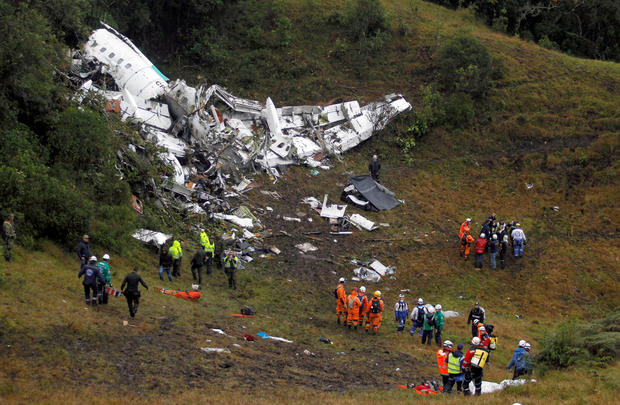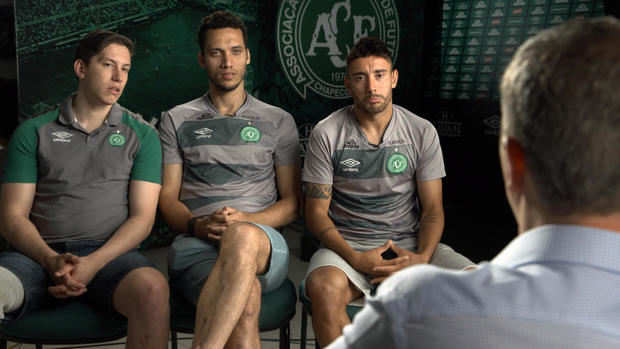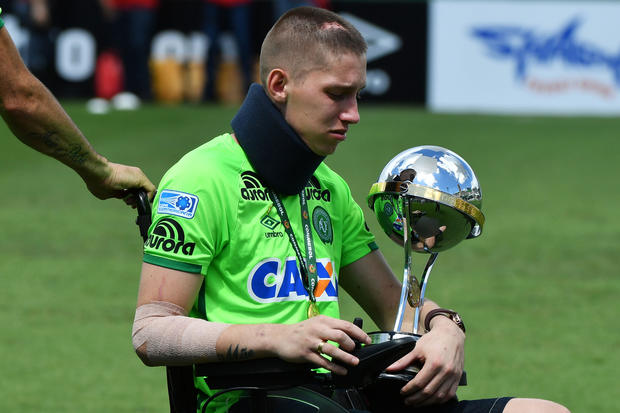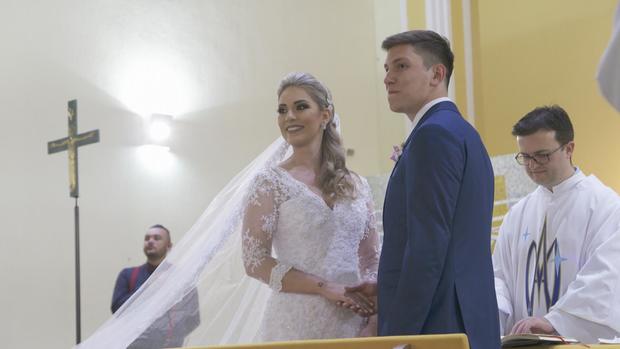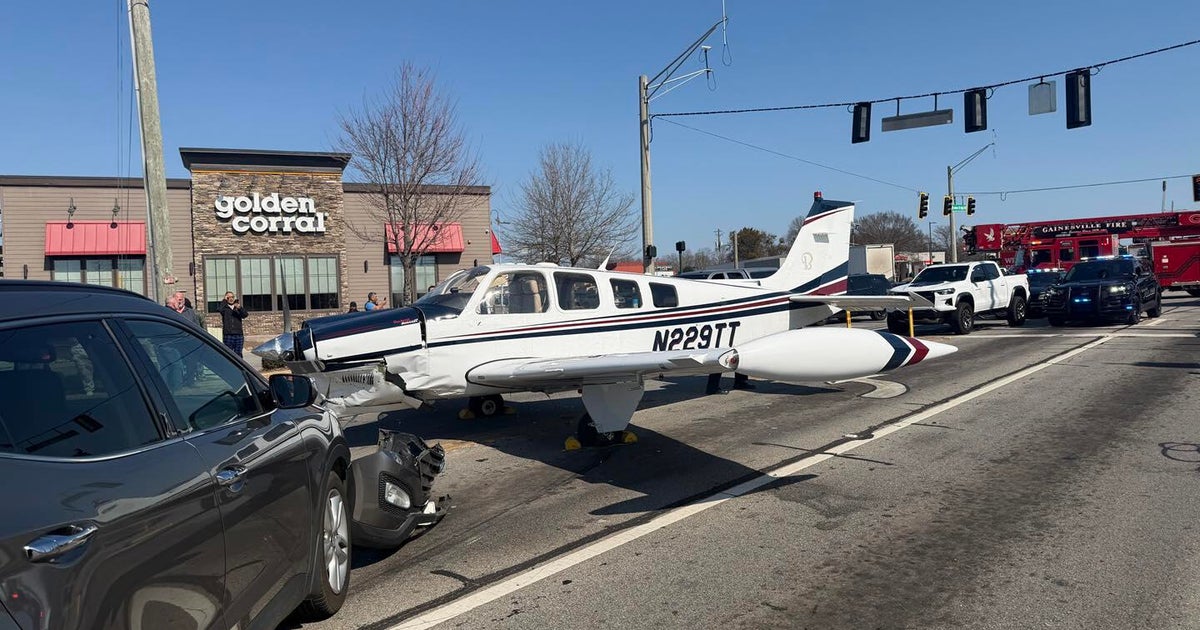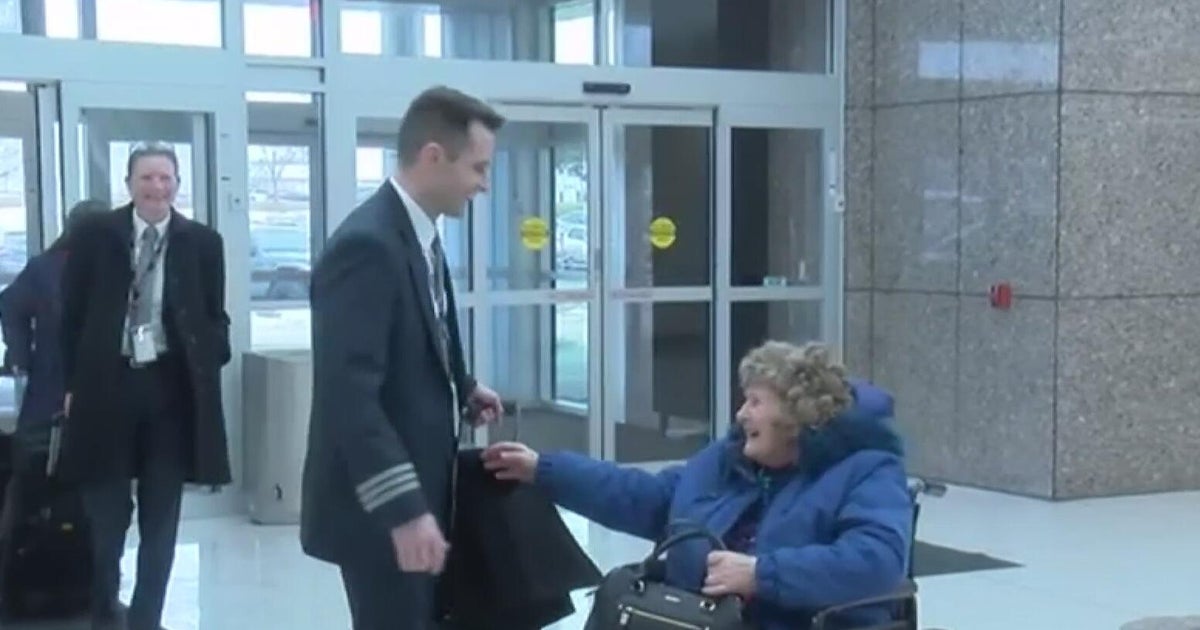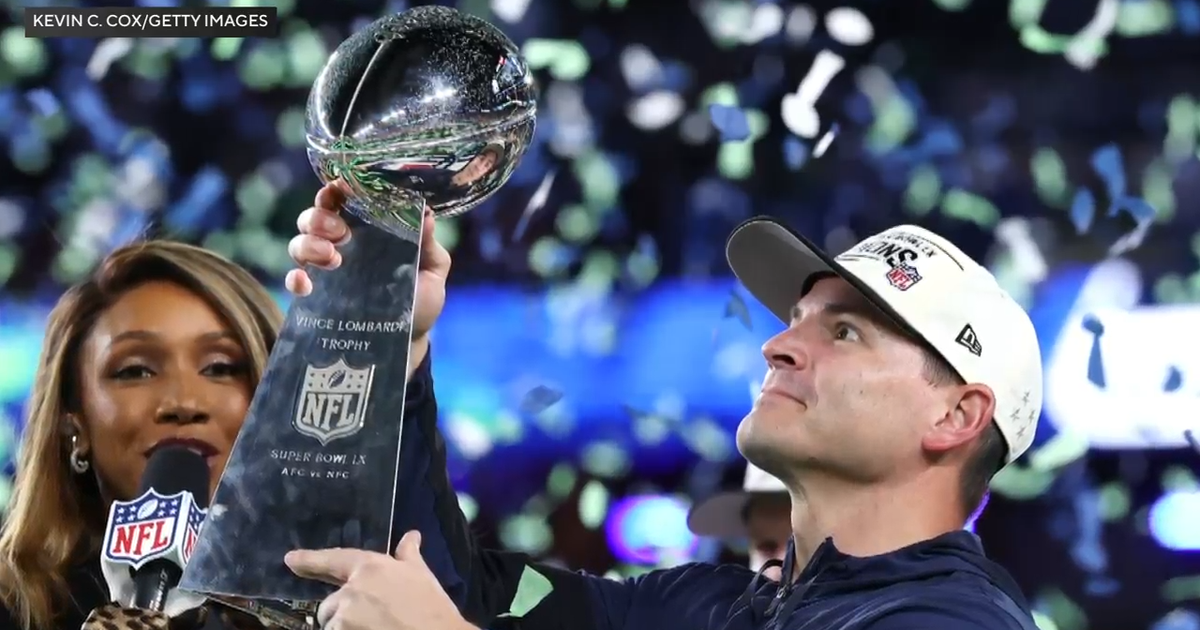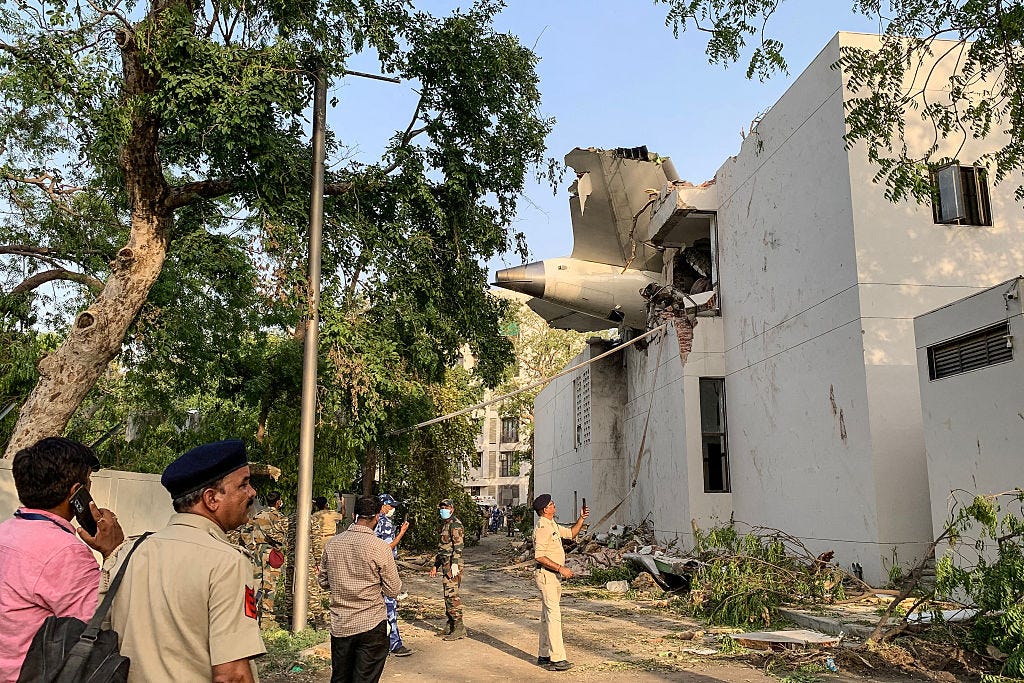A team rebuilds after the ultimate loss
Last November 28th, a professional soccer team from Chapeco, Brazil, boarded a flight for the biggest match in the club's history. With a little luck and a lot of pluck, this team of no names and underdogs had made an unlikely climb to the pinnacle of soccer-mad South America. Then, just a few miles from landing in Medellin, Colombia, their chartered plane crashed into a mountainside after running out of fuel. 71 of the 77 onboard were killed, including 19 of the team's 22 players. The crash itself, the plane violently split in half, was just the physical wreckage.
After the most horrific sports tragedy in years -- the concept of a rebuilding season has taken on a whole new dimension. In sports we often talk of gameplans. But there are no proven tactics for coming back from catastrophe like this.
A recent sunday in Chapeco, Brazil. It's the day of the Lord. It's also the day the Lord shares with the true national religion: soccer.
Carved out of the forest in the country's hard-working southern region, closer to Argentina than to the beaches of Rio, Chapeco is a city of immigrants. Most came from Europe in the last 100 years.
They all worship one team: Chapecoense.
Chape for short represents the smallest city competing in Brazil's top soccer league.
It wasn't that long ago that both geographically and in the sports universe, Chapeco resided in the middle of nowhere.
Matheus Saroli: I never heard of them until probably 2013
Jon Wertheim: You'd never heard of this team until four years ago.
Matheus Saroli: Yes. Never heard of them. Because they were a very small club from a small town.
Matheus Saroli comes from a proud Brazilian family of soccer players and coaches. His father Caio Junior became head coach of Chapecoense in 2016. By then the team had already made history. Ascending from deep in the minor leagues to the big-time in a span of just five years.
Jon Wertheim: How were they having this run? What made them so good?
Matheus Saroli: They had a special group of people, man. It came from the top down. And that year specifically, last year, they had a great squad. Not a lot of very famous people. But the team played as a team.
With great pride, Chape fans will tell you their club has no Peles. Instead, the team took on the characteristics of the community. In unpretentious, unfussy Chapeco, the club was a study in populism and discipline. Short on flair, long on odds, never outworked, they were that team opponents hated to face.
Last season the little club punching above its weight delivered a knockout blow when goalkeeper Danilo made a critical save.
It secured Chapecoense's spot in the championship of the Copa Sudamericana, one of the continent's most prestigious competitions.
"I remember many people on the plane were praying, many people saying, 'Jesus, help. My God, Jesus have mercy.'"
After the game, the players, the staff and their families celebrated in the locker room. As one they belted out in Portuguese a simple song, "Vamos Chape" or "Let's Go Chape". And five days later they went, on a flight operated by a cut-rate charter company called LaMia. How big a moment was this? A local news crew captured the players before takeoff, gleeful.
Happy about where they were going and how they got there.
Jon Wertheim: You've talked a lot about the culture of the club, and the administration. The people who put this culture in place, where are they?
Matheus Saroli: They were all on the plane.
Then their chartered plane crashed into a mountainside. 71 dead including Matheus' father, the head coach. But miraculously, inexplicably three players -- Jakson Follmann, Helio Neto and Alan Ruschel -- lived to tell the tale. Which they each do with remarkable candor down to the most chilling detail.
Jon Wertheim: when did you first sense something was very wrong?
Neto Helio: I felt it when the plane shut down. When the emergency lights came on, I said, "Jesus have mercy" I heard the noise of the wind. I remember an alarm going off and a voice came on in English to signal an emergency.
Jon Wertheim: What did you hear when you thought, "This plane might be going down?"
Jakson Follmann: Only the wind. There was no sound at all. Only the wind.
Neto Helio: I remember many people on the plane were praying, many people saying, "Jesus, help. My God, Jesus have mercy." I was praying loudly.
Found in the wreckage hours later, Neto would lie in a coma for nine days. Ruschel sustained a spinal cord injury. Follmann lost his right leg below the knee. The tragedy grew still more devastating when investigators discovered the cause. The reason these guys heard nothing but the wind on the way down? The engines had stopped operating. The plane had run out of fuel.
Jakson Follmann: Sometimes I ask myself why did all of this happen to us? Why were so many lives lost? So many fathers were lost, most had 3 or 4-year-old children. Innocent children who don't understand. This hurts a lot.
No one fully understands how the accident could have occurred. We do know the pilot took off without enough fuel and he has received the bulk of the blame from various investigations. Brazilian prosecutors determined the club was not negligent in hiring LaMia, an airline with only a few planes fit to fly, and that had an insurance policy families were told was invalid.
Barbara Monteiro: I often say that the plane did not only crash in Medellin, but it crashed on my life.
Barbara Monteiro was married to the forward Ananias. We spoke to her and the wives of three other players who died. Five days after the crash she was on Chapecoense's home field, not for a match, but for a funeral.
Barbara Monteiro: It was the most shocking moment of my life. It was devastating.
Leticia Gabriel's husband was star goalkeeper Danilo.
Leticia Gabriel: I remember seeing those trucks and that very strong rain. It seemed like God was looking at the tragedy and crying. As the coffins arrived at the stadium, it started to rain even harder. It was like a movie. Where the soldiers went to war and returned in those coffins. I hope to never see something like that again in my life. It was an unexplainable feeling.
The widows each received a life insurance payout worth about three years salary from the club and the Brazilian Soccer Federation, but they've also filed lawsuits against Chapecoense, and more cases are possible against the airline LaMia and their insurers.
Leticia Gabriel: We had so many plans -- to have more children, to build a house -- so many dreams. And all this ended overnight. I went back to the city where my parents' lived, with my son and without Danilo.
Barbara Monteiro: Imagine a life of pain, without love, without dreams and plans, without the provider of the house. Without father and husband. Empty.
"We had to rebuild, to restart. If we hadn't, I'm certain that the city would have been despondent."
Not long after the crash, the club made a firm, if controversial decision. For the good of the community -- as well as for financial reasons -- Chapocoense had to continue competing. New players and coaches were hired, the spirit of Vamos Chape, would be embodied effective immediately.
Maninho: Chape is a fighting team and always has been.
Known to all as Maninho, Chapecoense's new president has been heavily involved in the team since it was founded in the 1970s. He had the good fortune not to board the flight for Colombia.
Jon Wertheim: Did you have any instinct to, "Let's take a year off and just regroup and take a break"? Was that something that crossed your mind?
Maninho: No, we never considered that, never. We had to rebuild, to restart. If we hadn't, I'm certain that the city would have been despondent.
For the widows, it's been difficult to watch. The husband of Girlene Domingues was the team's all-time leading scorer.
She told us about the day all the wives were invited back to the stadium. Their late husbands were honored and then their replacements took to the field.
Girlene Domingues: I remember the day of that game, I saw my husband's shirt -- number nine, that he played with -- and when I saw it was not my husband, it gave me such a strong pain in my chest.
The widows say the team has not done enough to help them. The club president Maninho says Chapecoense has done everything they can. He's managing an old soccer dilemma, how much to push forward, how much to protect what lies behind.
Maninho: We cannot always satisfy everyone. There are some things in life that only with the passing of time will allow people to understand.
Time unspools, life persists for the town, the team and its players. While we were in Chapeco, Jakson Follmann got married, his two best men were Neto, now rehabbing and working on a comeback and Alan Ruschel, the only one of the three survivors who's stepped back out onto the field for the team.
His first game back in August was an exhibition in Spain held to raise funds for the families of Chape. That day he faced arguably the greatest player in the history of the sport.
The Brazilian visitors lost to Lionel Messi and Barcelona, 5-0.
The match revealed a bittersweet irony to the Chapecoense story: following the crash the team has received worldwide opportunities and attention perhaps only death could provide.
Jon Wertheim: You're only one man, you're one athlete, but I suspect you feel like you're playing for a lot more than yourself.
Alan Ruschel: Yeah, definitely. Whenever I go on the field, I always think a lot about all the guys.
Jon Wertheim: When you guys look back at everything this club's been through over the last year, what do you want the legacy to be? What do you want people to know?
Neto Helio: You walk into Chapecoense today, and what do you see of those who died? Nothing. There is nothing to remember them. It seems like no one died. People are enjoying our wonderful club but we must give credit to the men who fought and gave their lives so that Chapecoense could be where it is today.
The president of the club told us there are plans for a museum that memorializes those who died.
Grief, as they say, is custom made, a private journey, but after more than a week in Chapeco, this was apparent. In the face of tragedy, the invisible force that binds a team to their community can strengthen -- even with a completely new lineup of players.
Those players have struggled this year. When Sunday came, Chapecoense needed a win to help them stay up in Brazil's highest league.
Chape's fighting spirit was on display, as they beat a more established club from Rio, 2-0.
The loudest sound of the night came not with the goals or the final whistle but at the 71st minute of the match. It was then, as at every home game this year, that the crowd paused to remember the 71 members of their community who died last year. Serenading both the new players and the ones no longer here, they sang an old anthem that takes on so much symbolic weight: Vamos Chape.
Produced by Keith Sharman and Aarthi Rajaraman. Associate producer, Erin Horan. Field producer, Kate Steiker-Ginzberg.
